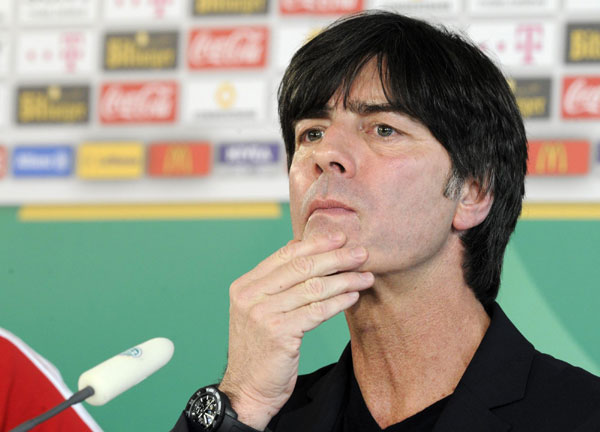Germany's rivalry with Dutch loses its edge: Loew
 0 Comment(s)
0 Comment(s) Print
Print E-mail
China Daily, November 15, 2011
E-mail
China Daily, November 15, 2011
 |
|
Joachim Loew, head coach of the German national soccer team, gestures during a news conference in Hamburg, November 14, 2011. Germany will face the Netherlands in a friendly match in Hamburg on Tuesday, November 15. [Photo/Agencies] |
The soccer rivalry between neighbours Germany and Netherlands has lost some of its edge in recent years, Germany coach Joachim Loew said on Monday, ahead of their friendly game on Tuesday.
"Germany versus Netherlands is always something special," Loew told reporters. "There have been extremely tough and bitter fights between the two teams but that has changed a bit."
Since the emergence of the Dutch as a global football powerhouse in the 1970s, the two sides have met on numerous occasions including Germany's 2-1 final victory at the 1974 World Cup.
The 1990 World Cup round-of-16 meeting ended with two players sent off and an infamous spitting incident as Germany again came out on top.
Netherlands got their revenge two years later with a Euro 1992 group-stage win on their way to their only major tournament victory.
"I think the rivalry has lost some of its weight. Back then there were very tough games. Back then there were incidents in a lot of games but today these do not happen so much. There are now lots of Dutch players in the Bundesliga, who have made Germany their second home," said Loew.
"It is a test game for both teams. This game has no influence on next year's (Euro 2012) tournament. So both teams will be sensible but also with the will to win. But not with an over-the-top aggression."
Attacking style
Asked whether Germany had become more Dutch in their style of play in recent years and the Dutch, lovers of offensive football, more result-minded, Loew said the Germans had learned a lot from their neighbours.
"They have excellent footballing education, their game is automated, they rarely come under pressure. For 30 years the Dutch cannot be beaten in terms of consistency," said the 51-year-old coach who has adopted a more attacking style for the three-times World Cup winners, long renowned for their power and endurance game.
The Dutch have played in three World Cup finals, including in 2010, but have never won the trophy.
"The Dutch always generate new players. They can always bring out more players. They always had the advantage that their young players, 18 years old, played for their clubs," said Loew, who steered Germany to a third-place finish at the 2010 World Cup with their youngest tournament team in 76 years.
"We have learned from them over the years. I don't know if the Dutch have become more German. It is clear that our education in the past 10 years has focused more on technique and skills. Before it was more power, running and fitness. Clearly it was necessary to think outside the box."






Go to Forum >>0 Comment(s)